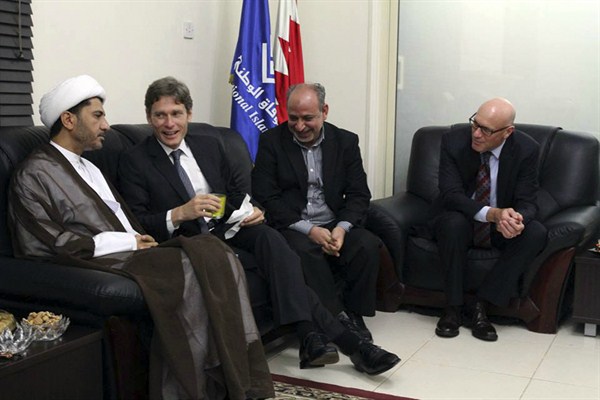The fallout from Bahrain’s expulsion of Tom Malinowski, the U.S. assistant secretary of state for democracy, human rights and labor, illustrates the continuing political impasse in this deeply polarized U.S. ally in the Persian Gulf. While the danger to the ruling Al Khalifa family posed by the 2011 popular uprising has long passed, positions on all sides have hardened, with little prospect of any political settlement to Bahrain’s deep-rooted inequalities. A fragile stasis has instead developed between a Bahraini government unwilling to make meaningful political concessions and a fragmented opposition unable to mount a serious challenge to the status quo.
Malinowski was declared persona non grata and ordered to leave Bahrain on July 7, a day after meeting with leaders of Al-Wefaq, the main Shiite Islamist opposition group, at the U.S. Embassy in Manama. Malinowski met with Al-Wefaq leader Sheikh Ali Salman and his deputy, Khalil al-Marzooq, without a Bahraini government official present, and was promptly accused of flouting a September 2013 ruling requiring a Foreign Ministry representative to attend all such meetings. In the days that followed, Ali Salman and al-Marzooq were charged with violating Bahrain’s law on political associations. The Ministry of Justice subsequently filed a lawsuit against Al-Wefaq seeking a three-month suspension of its activities, on the grounds of procedural irregularities in the group’s internal decision-making processes.
These latest developments have three troubling implications for U.S. interests in Bahrain. The first concerns the likelihood of an opposition boycott of Bahrain’s upcoming parliamentary vote in October. In June, Al-Wefaq and other opposition political societies—actual parties are banned in Bahrain, as in all other Gulf states—announced they would not take part in the elections for the Council of Representatives, the lower house of Bahrain’s parliament, unless the government makes sweeping and immediate political concessions. An objective of Malinowski’s visit to Bahrain was to secure the return of all mainstream societies to a parliament that has been devoid of opposition voices since all of Al-Wefaq’s legislators resigned their seats in 2011. Malinowski’s mission now lies in tatters, and opposition leaders will struggle to justify any involvement in a political process they feel is stacked heavily against them.

